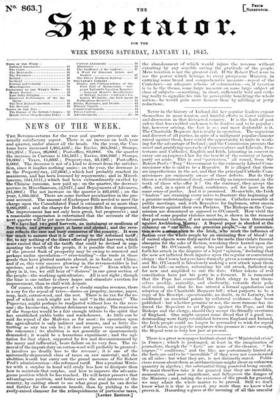NEWS OF THE WEEK.
THE Revenue-returns for the year and quarter present an un- usually satisfactory aspect. There is an increase on both year and quarter, under almost all the heads. On the year, the Cus- toms have increased 1,305,4531.•' the Excise 365,3041.; Stamps, 185,2351.; Taxes, 26,0001.; Post-office, 83,000/. On the quarter the increase in Customs is 135,167l.; Excise 200,1691.; Stamps, 78,0001.; Taxes, 11,633/.' Property-tax, 33,126/. ; Post-office, 3,000/. The decrease is not of a kind to detract from the satisfac- tion since it implies nothing amiss : on the year, the decrease is in the Property-tax (57,6644) which had. probably reached its maximum, and has been lessened by repayments; and in Miscel- laneous, (941,1114) which had been extraordinarily swelled by ' the Chinese ransoms, now paid up : on the quarter, the decrease accrues in Miscellaneous, (2,7274) and Repayments of Advances, (81,0800 The net increase on the quarter is 493,9161.; on the year, 1,163,595/. There are some further peculiarities in the pre- sent account. The amount of Exchequer Bills needed to meet the charge upon the Consolidated Fund is estimated at no more than -2,095,929/. ; and the charge for Deficiency Bills has disappeared. The improvement has not only been great, but progressive ; and it reasonable expectation is entertained that the accounts of the next quarter will be yet more favourable.
We have had two good harvests, an instalment or modicum of free trade, and greater quiet at home and abroad ; and the reve- nue reflects the ease and busy commerce of the country. It were too much to assume that it is all owing to the reformed tariff ; for, to say nothing of the direct effect of plentiful harvests, which must exceed that of all the tariffs that could be devised in aug- menting the wealth of the people, if is possible that not a little of the present flush of prosperity may be owing to renewed and perhaps undue speculation— over-trading"—the trade in those goods that have glutted markets abroad, as in India and China; and if so, this very success glowing in the revenue-tables is but specious, and a preliminary to new "distress." Even while we glory in it, too, we still hear of" distress" in one great section of the people—the working agriculturists. All is not right ; though the time is one rather to cheer hopes and stimulate exertion for improvement, than to chill with despair. Of course, with the prospect of a steady surplus revenue, there
is a cry for the repeal of taxes duties on property, income, paper, soap, malt, cotton-wool, and the rest. There is no tax for the re- peal of which much might not be said "in the abstract." The Paper-tax might perhaps be readjusted without loss to the reve- nue • the Income-tax, without detriment to equity. The remission of the Soap-tax would be a fair enough tribute to the spirit that has established public baths and wash-houses. As little can be said for repeal of the Malt-tax as for most : its operation upon the agriculturist is only indirect and remote, and as little dis- turbing as any tax can be,; it does not press very sensibly on the consumer ; its abolition is not generally or spontaneously demanded ; it would be a hazardous experiment ; and the agi- tation for that object, supported by few and discountenanced by the many and influential, bears failure on its very face. The re- moval of the import-duty on cotton-wool will probably be granted : it involves no deadly loss to the revenue ; it is one of the universally-deprecated class of taxes on raw material ; and the abolition would but carry out the grand measure of Sir Robert Peel's administration—the reformed tariff. But a prudent Minis- ter with a surplus in hand will study less how to dissipate than how to maintain that surplus, and how to improve the advanta- geous position which he has reached. He will better preserve that advantageous position and better serve the real interests of the country, by casting about to see what great good he can devise and further for the common benefit, than by yielding to the wily-raised clamour for the relinquishment of particufar taxes, the abandonment of which would injure the revenue without extorting by any sensible saving the gratitude of the people. Mere taxation is not the greatest evil. If Sir Robert Peel were to use the power which belongs to every prosperous Minister, in carrying some broad and comprehensive measure—repeal of the Corn-laws—an adequate scheme of colonization—or, if taxation is to be the theme, some large measure on some large subject or class of subjects—something, in short, sufficiently bold and strik- ing really to signalize his rule by perceptibly benefiting the whole nation—he would gain more honour than by nibbling at petty reduction:.


























